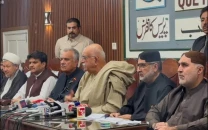Pakistan's governance crisis impedes prosperity
State promised by Jinnah has devolved into system dominated by exclusion, elitism and inequality

What is a state? According to Ibn Khaldun, it is an entity that restricts, controls, and strives to eliminate injustice. It builds a governance system that upholds human equality, dignity, and liberty. Through fair governance, the state strives to provide basic necessities, growth opportunities, education grounded in values, and secure living conditions. It ensures the rule of law for all, including the government, institutions, and individuals.
In a nutshell, a state depends on a governance system that is people-centric, rooted in the rule of law, and committed to justice and prosperity.
Pakistan was envisioned as such a state. It was promised that the government would establish a social justice system, a welfare economy, and dignity for all. It would ensure peace and a people-centric system grounded in Islamic principles, achieved through inclusivity and democratic participation. Quaid-e-Azam Muhammad Ali Jinnah emphasised the need for a fair governance system, saying the very justification of the state would depend on it.
Unfortunately, after Jinnah's death, that vision began to fade. The ruling elite failed to understand his vision, denied the people their right to elect leadership, and became embroiled in power struggles. Bureaucratic interference took root early, sidelining democratic processes. In 1955, Ghulam Muhammad dissolved the assembly, seizing control and strengthening bureaucracy's grip. It marked the first major betrayal of the people's will and paved the way for martial law.
Pakistan soon became an experimental lab for imported governance models. Rulers introduced policies shaped by Western institutions. From Ghulam Muhammad onwards, the leadership kept experimenting – implementing liberal economic policies without liberal democracy, and introducing socialism under the control of feudals and the ultra-rich.
Religion, especially Islam, was repeatedly used to manipulate people but never implemented in its true spirit. This misuse goes against Quaid-e-Azam's vision of an Islamic system grounded in justice and equity.
Another defining feature of Pakistan's governance is elitism and exploitation. Though numerically small, the elite have captured the entire system. They enjoy vast privileges funded by the average taxpayer. Their grip on power is so deep that retirement is no longer an end - "post-retirement parking" has become common, with senior officials securing perks even after leaving office.
In recent years, this process has accelerated. The elite have abandoned merit and institutionalised favouritism. Now, the system has moved beyond capture to outright exploitation. Ironically, these elite deny their exploitative behaviour and instead blame each other – politicians fault the military, and military rulers blame politicians. Neither offers solutions.
The governance model has also become exclusionary. This exclusion starts in education and extends to jobs, social mobility, and access to justice. Education, which should be a tool for empowerment and nation-building, is riddled with inequality. The Constitution promises free education for every child through Articles 25-A and 37-B, but the state has failed to deliver.
Instead of strengthening public education, the government enabled the rise of private institutions. Since the 1980s, private schools have mushroomed, now comprising 38% of all institutions and educating 44% of children. These institutions often follow foreign curricula, diverging from the national framework.
State neglect – lack of investment in infrastructure, teacher training, and quality control – has further degraded public education. Consequently, many middle-class families are forced to turn to expensive private schools, while the elite send their children abroad or to top-tier private schools in Pakistan. Since policymakers' children don't attend public schools, they remain indifferent to the sector's decay.
This has long-term consequences. It creates deep societal divisions and undermines nation-building by denying equal opportunity.
The job market is similarly flawed. It is rigged in favour of those with power. Merit is often irrelevant. Instead, elite families pull strings to get their children high-paying jobs in public institutions, think tanks, NGOs, or international agencies. These organisations oblige, hoping to curry favour with decision-makers. This culture of nepotism shuts out qualified candidates from ordinary backgrounds.
Bribery is another barrier. Additionally, a damaging narrative has taken hold: only private university graduates are employable. Public university graduates are sidelined, worsening inequality and fuelling resentment among youth. Moreover, retired officials – both domestic and international – further distort the job market.
Former employees of the International Monetary Fund, World Bank, or local government use their networks to bypass competitive hiring processes, denying opportunities to younger, deserving candidates.
Many of these retired individuals sell themselves as visionary consultants or leaders. If they were truly dedicated, one might ask, why didn't they perform during their tenure? And if their intentions are noble, why not work pro bono instead of drawing large salaries and enjoying high-level perks?
Many have also entered the consulting business. In theory, there's nothing wrong with that – if it's based on merit. In reality, however, these consultancies operate through networks of influence. Former officials use their ties within the bureaucracy and military to secure contracts. They promise future favours to juniors who help them now.
This has given rise to a class of "on-the-job consultants" – individuals who leverage their government roles to position themselves for future consultancies. They exploit their access to training programmes and higher education to build credentials and connections while still in office, and later transition into lucrative consulting roles.
This system entrenches inequality and marginalises the very citizens the state was supposed to empower. The way forward must start with restoring the people's role in decision-making. A state is not simply a government – it is a collective promise to its people. Pakistan must return to that promise.
The writer is a political economist and a visiting reserach fellow at Hebei University, China























COMMENTS
Comments are moderated and generally will be posted if they are on-topic and not abusive.
For more information, please see our Comments FAQ